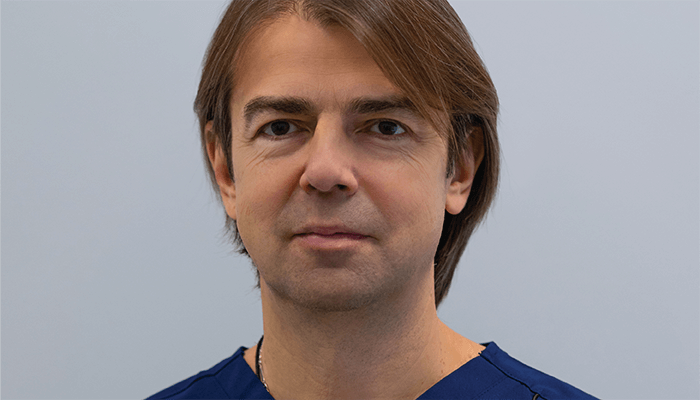
First of all, are you safe? How about your colleagues?
During the war, nobody can be sure of their safety anywhere in the country. I am currently in Kyiv, which has sustained constant shelling. Unfortunately, many of my colleagues and their families have been in danger. Many Ukrainian ophthalmologists with whom I am in contact continue to provide care in their cities, and those who left for central and western Ukraine offer their assistance to local clinics.
Please tell me about your background and your practice.
I specialize in vitreoretinal surgery. I completed my residency in ophthalmology in Kyiv, Ukraine, and worked in a state hospital for 20 years. I defended my PhD degree in collaboration with Columbia University, New York, USA. I prepared a doctoral dissertation on the surgical treatment of proliferative diabetic retinopathy and regularly trained in clinics in the UK (Moorfields Eye Hospital in London), Germany (EVRS Training School in Bremen), Italy, France, Austria, and the Czech Republic. I founded and was the head of the Department of Minimally Invasive Vitreoretinal Surgery, and held the position of an Associate Professor of the Department of Ophthalmology at the Academy of Postgraduate Education in Kyiv. For the last six years, I have been working in a private clinic and I am now President of the Ukrainian Vitreoretinal Society (UVRS).
Who were your mentors?
I’ve been really lucky with my teachers! They have been wonderful people and professionals, some of whom have now sadly passed: Mykola Sergienko and Yurii Kondratenko from Ukraine, Zdenek J. Gregor who practices in the UK, Claus Lucke from Germany, Basil Worgul, Vincent S. Reppucci, and George Bresnick from the USA.
How does the Russian invasion affect the practice of ophthalmology in Ukraine?
Russia’s military aggression against Ukraine has made it impossible for ophthalmologists to continue their medical practice in many cities, especially in the north, east and south of Ukraine, where heavy fighting is currently taking place. The teaching in medical school in Ukraine has also been seriously disrupted.
Before the invasion, did you have any contingency plans?
I had no such plans. Despite the constant threats from Russia, none of us believed that a full-blown war would begin.
What are the major and most pressing challenges Ukrainian ophthalmologists are facing?
If we talk about a medical problem, then this is the severity of combat injuries and their combined nature. We have also seen high rates of endophthalmitis. Another difficult task is to provide all the necessary instruments and consumables for ophthalmic surgery – supply chains are of course disrupted – and that’s what we’re currently working hard to fix.
What have you had to do in the past month that you never imagined yourself having to do?
As a practicing surgeon, I never thought that I would be spending so much time watching news from the front, and I did not imagine that I would be able to determine the source of an explosion by the sound of it. Now, my main task as the President of the UVRS and one of the coordinators in Ukraine is to organize the logistics of international ophthalmic care coming to us. And this is something I have never done before.
You traveled abroad professionally and worked with colleagues from abroad before. Have those colleagues been in touch?
After the start of the Russian invasion, many foreign colleagues and organizations expressed support and offered help. We really appreciate it. The support has come from around the world – but not from Russia. In the early days of the invasion, I talked a lot with my Russian colleagues, and almost all of them (except one) supported this war – a war to destroy the Ukrainian people. After that, I stopped considering them to be my colleagues. And that’s why we prepared and sent letters to international ophthalmological societies with a request to suspend the membership of Russian ophthalmologists in these organizations.
What can ophthalmologists from other parts of the world do to help their Ukrainian colleagues?
First of all, we need the moral support of all ophthalmologists in the world condemning this barbaric war. Russia should be made to feel like an outcast in a civilized world. We also need help with consumables for surgery, as the purchase and delivery of them by Ukrainian distributors is extremely difficult in places where there is fighting.
And, if nothing else, simply remember that we are fighting against the second strongest army in the world – not only for our right to live and speak our language but also for the whole free world. We are on our own land, and we will win.
Here’s part of a statement that the Ukrainian Vitreoretinal Society published on February 28, 2022:
“Since 2014, war on the territory of Ukraine has been going on. Russian military forces and their allies already killed thousands of Ukrainian soldiers. On 24th of February 2022 we, the Ukrainian nation, were attacked by one of the most powerful states and armies in the world.
After four days of the war, our nation faces exceptionally brutal and inhuman military intervention in the last 80 years. Many civilians, including children and women, have been killed in their own homes. State infrastructure has been severely damaged. Hundreds of thousands of people were forced to escape. Hundreds of thousands have remained without houses, food, and future.
In these difficult and terrifying days, we ask the world to help us and to stand side by side with us in this struggle against evil.
The following days and weeks, we await a flow of patients with head and eye injuries. The international suppliers and company representatives ended their activity on the territory of Ukraine on the first day of the war. Hence, the stocks of medical devices required for eye surgeries are limited. We would appreciate any kind of help, which would allow us to do our job under the war conditions, and help injured soldiers as well as civilians.”
